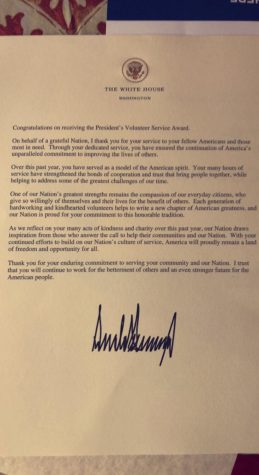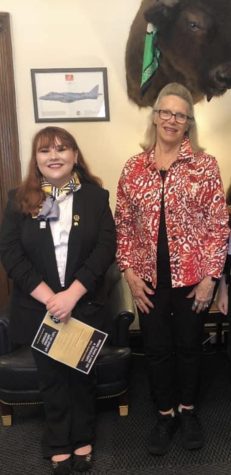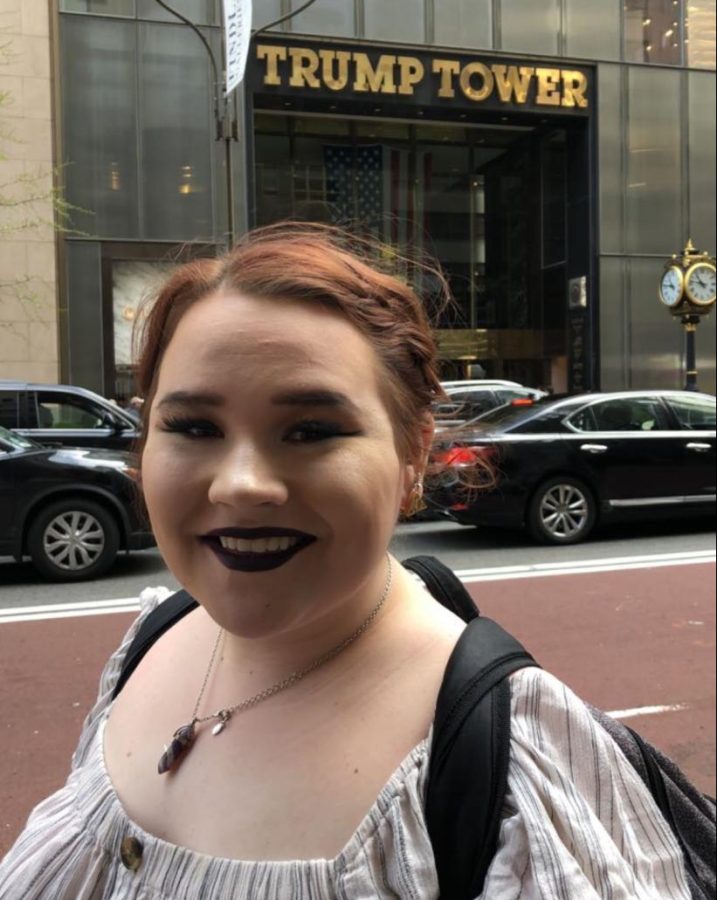I was a Trump Republican. What changed my mind?
Photo courtesy of Laken Kincaid
Laken Kincaid stands outside of Trump Tower in New York City in April 2019. At the time, Kincaid was a staunch Trump supporter.
Nov 4, 2022
This column comes after years of inner dialogue and hundreds of debates with colleagues and relatives alike. It is a piece I have dreaded writing because I hate to create a schism within my work. Yet, as I have tiptoed the line between staying quiet and advocating, I decided that I should explain my winding political journey which continues to evolve constantly.
While you can faintly see my political arc in my past Carroll News World News columns or through my verbose personal opinions in ink, my rollercoaster of internal ideological shifts is not as obvious; the starting point is so far off that it feels hazy to conceptualize. Nevertheless, I must recognize these alterations to know my own journey. In the words of Maya Angelou, “if you don’t know where you’ve come from, you don’t know where you are going.”
However, before I begin, let me preface this article by saying my intention is not to demonize one political party over the other or to try and convert the reader to my ideology. Instead, it is to articulate that anyone’s views can change drastically over time, including your own. Nowadays, Americans are so terrified of both personal revision and acknowledging that they were wrong that they refuse to be open-minded to other thought processes; I know because I felt the exact same way.

However, I hope these words, while still a hair pointed, show that it is okay to rethink your convictions no matter how cemented they feel. After all, you may realize that you were lying to yourself for years.
I state this with bated breath but I used to be a faith and flag Republican. For instance, I had “All I need is Jesus, coffee and Trump” in my Instagram bio followed by a plethora of red, white and blue emojis. What makes this even more ironic is that I did not even drink coffee at the time, but I digress.
It is easy to blame the fact that I grew up in a staunchly red state like West Virginia for this; I was engulfed by an echo chamber that reverberated the same beliefs over and over again. The difference was either dismissed outright or spat upon, becoming a public spectacle of ridicule as your local redneck waves an American and Confederate flag at the same time, double-fisting contradicting points in history. You know you were the town liberal when you were mentioned in the “Sophia Neighborhood Watch” Facebook group.
At Independence High School, if I remember correctly, there were two to three liberal-identifying individuals in my Advanced Placement Government class in 2019. The other twenty-some seniors in the class were highly conservative. Naturally, we fed off of each other’s energy and strengthened our own opinions, the ideas of the liberals becoming static in the background. I used these synonymous theories to strengthen my own rather than probe why there were others on the opposite end of the spectrum. It also does not help that we all lived in a news desert where it took extra effort, much of which the average high schooler is not willing to put forth, to find opinions that differed from our own.
I continued to preach MAGA literature and the like for years from a makeshift pulpit of fire and brimstone. I watched the 2016 and 2018 election races like they were the Super Bowl, slowly evolving into the political junkie I am today (albeit skewed much differently). When Trump won, I was ecstatic; never mind that this was only a month or so after he was exposed for sexual assault allegations which I happily brushed off as locker room talk or “Democrat propaganda.” The echo chamber rattled on.
A few months into senior year, all of the regurgitated rhetoric poured down my throat seemed to be muffled amidst a global pandemic. I was separated from the other conservatives through statewide lockdowns and was forced to be on my own. Like a worker bee led astray, I was away from the hive mind I found comfort in. As the world went dark, I became scared because I had nowhere to grab opinions from and could not fathom creating my own ideas. I felt like nothing without a Republican community wolf pack.
Nevertheless, two months later, that fear of isolation turned into rage at the system. After George Floyd’s death in the summer of 2020, I felt my heart crack. At my core, I am empathetic and I was jarred by the brutality occurring in front of my very eyes. Combining this with my growing worry over Trump’s navigation of the COVID-19 pandemic, I started to question the structure that created the person I was. Blind acceptance started to fade away into a reality check and I lost my core views. If you want to talk about anxiety, imagine declaring yourself as a political science major, thinking you know everything about the state of the nation at hand, and then rethinking all of your guiding tenets right before your first class.

After some additional reading, I walked (or Zoomed, rather) into my freshman year as a slightly right-leaning independent. I felt like an imposter sitting in my introductory government classes without an inkling of who I was while still spewing out political history like a busted hydrant. Between March and August, I was a shadow of my past, boisterous self. I had to rebuild all I knew.
Luckily, that reconstruction came in the form of PO104 with Margaret Farrar. While I have not talked to her since that class, spare a few quote requests for the paper, I accredit her and her Political Thought course with curating the political philosophy I follow now.
Through two and a half hours of class and my own research on things like critical race theory and John Stuart Mill, I reached the point I am at currently. According to the Pew Research Center political typology quiz that I was forced to take by Multimedia Editor TJ Lindstrom, I am a member of the outsider left. When I first joined the class, I was between the ambivalent and populist right. You can also compare this to my high school ideology where the scale was so red it marred the page. Needless to say, I changed.
This story probably tracks with many of the other collegiates who changed party affiliations after attending college, a right-wing deemed liberal factory. In spite of that, this piece is not to state that universities mold all bleeding-heart conservatives into fighting liberals within ten to twelve business days. Instead, it is a cautionary tale.
I went through five stages of grief with politics starting with the denial of my own party’s actions and ending with the acceptance that I no longer identify with the party altogether. It was absolutely terrifying to realize I was being deceptive to myself, even more horrifying to admit it out loud. Yet, it was so worth it.
It is easy to find one thing you partially agree with and stick with it, why else do people have midlife crises when they realize they chose conformity over their dream for twenty years straight? It is also difficult to say it is wrong after years of nodding along. Rather than clinging to your personal status quo out of trepidation, I challenge you to question your beliefs and question them often. I did not want to change my party registration even after I was outraged by a daft response to a global pandemic or senseless murder. Because I wanted to stay comfortable, I stalled my own growth in the long run.
If I may give you one piece of advice as you navigate this election and many more to come: align your values with yourself, do not align yourself with your values. If something rubs you the wrong way, meditate on it and find its roots. If you do not look for outlooks that rival your own, branch out. The first step to flourishing is cutting away the parts of yourself that kill you in the end.













